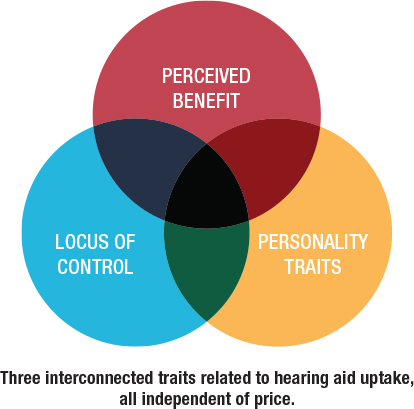
Overcoming Hearing Aid Objectives: It is More than Cost
Brian Taylor, Au.D.
That two-thirds of adults do not wear hearing aids, primarily due to high retail costs, is a well-worn industry trope. A recent paper in JAMA Otolaryngology by Katherine Sternasty and Sumit Dhar at Northwestern University, entitled Barriers to Hearing Aid Adoption Run Deeper Than the Price Tag, sheds valuable light on other reasons for non-use. According to the authors, “focusing on cost as the sole barrier to hearing aid uptake is overly simplistic and perhaps a hindrance to a more effective solution.”
If retail costs were the main barrier to hearing aid use, countries with programs that keep out-ofpocket costs extremely low would see a much higher rate of hearing aid use. The data from several studies, as cited in this paper, does not support the assertion that cost is the primary barrier to nonuse of hearing aids.
The authors focus their attention on the concept of perceived benefit, which is a combination of monetary value and the social value of hearing aids. They suggest the subsidies provided by some countries that cover much of the out-of-pocket costs of hearing aids do not outweigh the lack of perceived social value for many individuals who might otherwise benefit from hearing devices. Social value as defined by the authors, “is the sum of self-perceived benefit and benefit perceived by others related to the purchase of a product.”
To support their point, Sternasty and Dhar cite a German survey in which the top five reasons for not seeking hearing aids were: (1) physical comfort, (2) the inability of hearing aids to restore natural hearing, (3) hearing well enough in most situations, (4) hearing loss not severe enough, and (5) having more serious priorities. Of course, social value is likely linked to all five of these self-reported barriers.
 Perhaps the most valuable part of this paper is the authors’ reflections on the concept of locus of control (LOC) and how LOC influences personality traits. Locus of control refers to the extent by which individuals believe they have control of their own life outcomes. People with an externally focused LOC believe their outcomes are out of their control and are a result of factors such as luck or fate. As the authors point out, an individual with an external LOC who has hearing loss would not be motivated to seek hearing aids unless they were recommended by a trusted expert such as a physician.
Perhaps the most valuable part of this paper is the authors’ reflections on the concept of locus of control (LOC) and how LOC influences personality traits. Locus of control refers to the extent by which individuals believe they have control of their own life outcomes. People with an externally focused LOC believe their outcomes are out of their control and are a result of factors such as luck or fate. As the authors point out, an individual with an external LOC who has hearing loss would not be motivated to seek hearing aids unless they were recommended by a trusted expert such as a physician.
In contrast, individuals with an internal LOC believe that life outcomes are consequences of their own actions – that a person determines their own fate. An individual with an internal LOC who experiences hearing loss would be self-driven to seek hearing aids without the need to be validated by others. Locus of control, as the authors suggest, shapes how a person plans to acquire hearing aids but also underlying personality factors and stigma.
Finally, the authors state, “we believe that personality traits and LOC are intimately intertwined and have an undeniable influence on hearing aid uptake, independent of the price tag.” For clinicians who interact with persons with hearing loss every day, many of which are often in serious need of amplification, the insights from this paper suggests many non-audiological characteristics are critical in the treatment planning and goal setting process and well worth the time trying to better understand prior to recommending hearing aids, regardless of their retail price tag. ■
